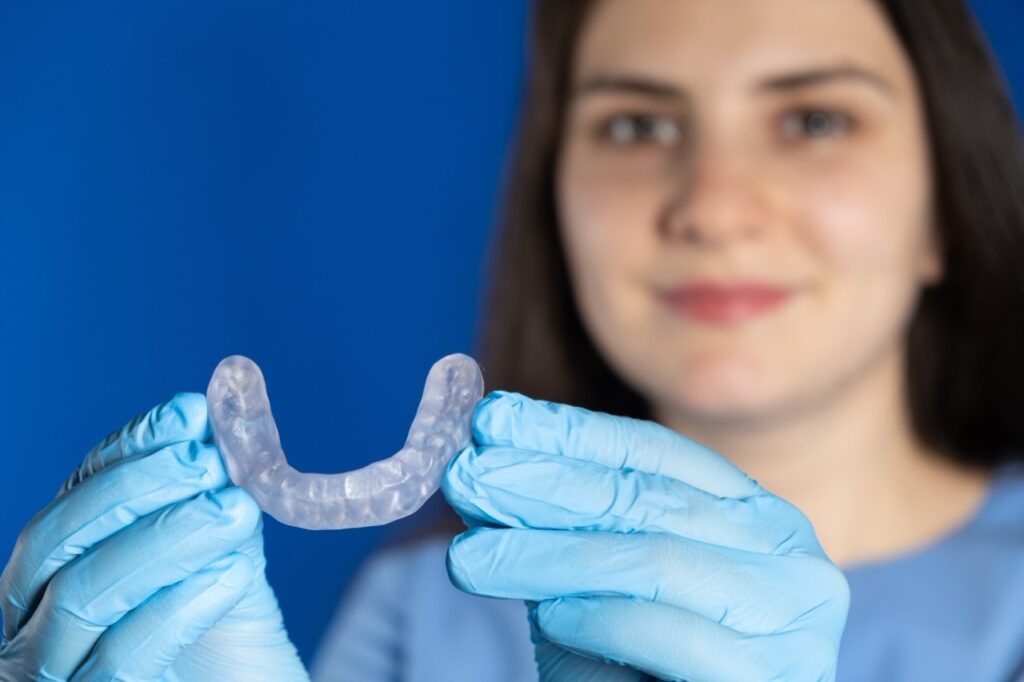Resource Library
Start Reading

Do you feel persistent soreness in your jaw?
Do you often catch yourself clenching or grinding your teeth?
Do you regularly wake up with headaches that just won’t go away?
Teeth grinding, chronic headaches, earaches, and other symptoms could indicate you have a temporomandibular joint disorder (TMD).
The temporomandibular joint—the TMJ, though some people use those three letters to refer to TMJ disorders—is the complex hinge joint connecting the jawbone (mandible) to the skull (temporal bone). This joint is on both sides of the head and plays a critical role in opening and closing the mouth, chewing, and speaking.
Several types of TMDs exist. They affect about 10%-15% of adults, as Dr. Thomas P. Sollecito, professor and chair of oral medicine at the University of Pennsylvania School of Dental Medicine, told The Guardian.
While most TMDs don’t require treatment, some do. Understanding frequent symptoms of TMJ disorders can help manage these conditions effectively and prevent further complications.
The most common TMJ disorders and their symptoms include:
Pain in the muscles supporting the TMJ and the connective tissue around them (the fascia) is the most prevalent TMJ disorder. It is characterized by:
 Bruxism is excessive teeth grinding or clenching. It can occur during sleep (sleep bruxism) or while awake (awake bruxism). Signs of bruxism can include:
Bruxism is excessive teeth grinding or clenching. It can occur during sleep (sleep bruxism) or while awake (awake bruxism). Signs of bruxism can include:
The articular disc—the dense, fibrous connective tissue that acts as a cushion between the jaw bones of the jaw and the skull, reducing friction and allowing for smooth movement—can become displaced, causing jaw movement problems. Symptoms may include:
Osteoarthritis or rheumatoid arthritis can affect the TMJ, leading to inflammation and degeneration. People may experience:
Misalignment of the teeth and jaw can cause such TMJ symptoms as:
An association between TMJ/TMD and headaches as well as earaches exists because of referred pain. Referred pain is pain perceived in a location different from the pain’s actual source.
In the context of teeth grinding and other TMJ disorders, individuals may experience ear pain even though the problem originates from or around the jaw. Nerves from different areas of the body can converge and share pathways in the nervous system, leading to confusion in the brain about the true source of discomfort.
 How long does temporomandibular joint disorder last?
How long does temporomandibular joint disorder last?
In some cases, a TMJ disorder will resolve itself in one to two weeks. “The vast majority don’t require treatment,” Dr. Sollecito told The Guardian.
Some people can live with a mild TMD. For instance, Dr. Sollecito estimates a third of people have a jaw click. If the issue isn’t causing damage to the teeth or pain, no intervention is usually necessary.
However, not all TMJ problems take care of themselves.
If you’re experiencing TMJ symptoms, you should consult with a dental care professional as soon as possible, especially if your symptoms have been persistent. Your dentist will be able to accurately diagnose your condition and, as necessary, develop a treatment plan.
Some treatment options include:
Self-care may involve applying ice or heat to the affected area, engaging in gentle stretching exercises for the jaw, and practicing relaxation techniques to manage stress and anxiety, which can cause and exacerbate disorders of the TMJ.
Additionally, stress-reduction strategies like mindfulness or yoga can also help patients who are prone to bruxism.
Dentists may recommend such over-the-counter pain relievers as ibuprofen or acetaminophen to alleviate discomfort. In some cases, muscle relaxants or antianxiety medications may be prescribed if teeth grinding is related to stress or anxiety.
Dentists often prescribe custom-fitted mouth guards or splints to help protect teeth and alleviate teeth grinding and clenching.
Night guards are especially important in cases of sleep bruxism. Patients aren’t always aware they’re grinding their teeth during sleep, even though their bite can exert up to 250 pounds of force.
Physical therapists can work with patients to strengthen jaw muscles and improve range of motion through specific exercises.
Some cases of severe bruxism may necessitate dental corrections to fix misaligned or damaged teeth. These measures can involve reshaping the teeth’s chewing surfaces or using dental crowns to repair significant damage.
In extremely serious cases, dentists may explore oral surgery options if other treatments fail and the TMJ disorder is severely impacting the patient’s quality of life.
 The right dental team is crucial for managing TMJ disorders. At Penn Dental Family Practice (PDFP), our commitment to comprehensive treatment plans, advanced care, and patient-focused techniques make us an ideal choice.
The right dental team is crucial for managing TMJ disorders. At Penn Dental Family Practice (PDFP), our commitment to comprehensive treatment plans, advanced care, and patient-focused techniques make us an ideal choice.
Many of our patients with teeth-grinding issues or other TMDs report significant improvements in their symptoms and overall quality of life after receiving treatment. Our expert, compassionate providers want to help you enjoy a pain-free and healthy smile, too.
Schedule your appointment online or call us at 215-898-PDFP (7337).